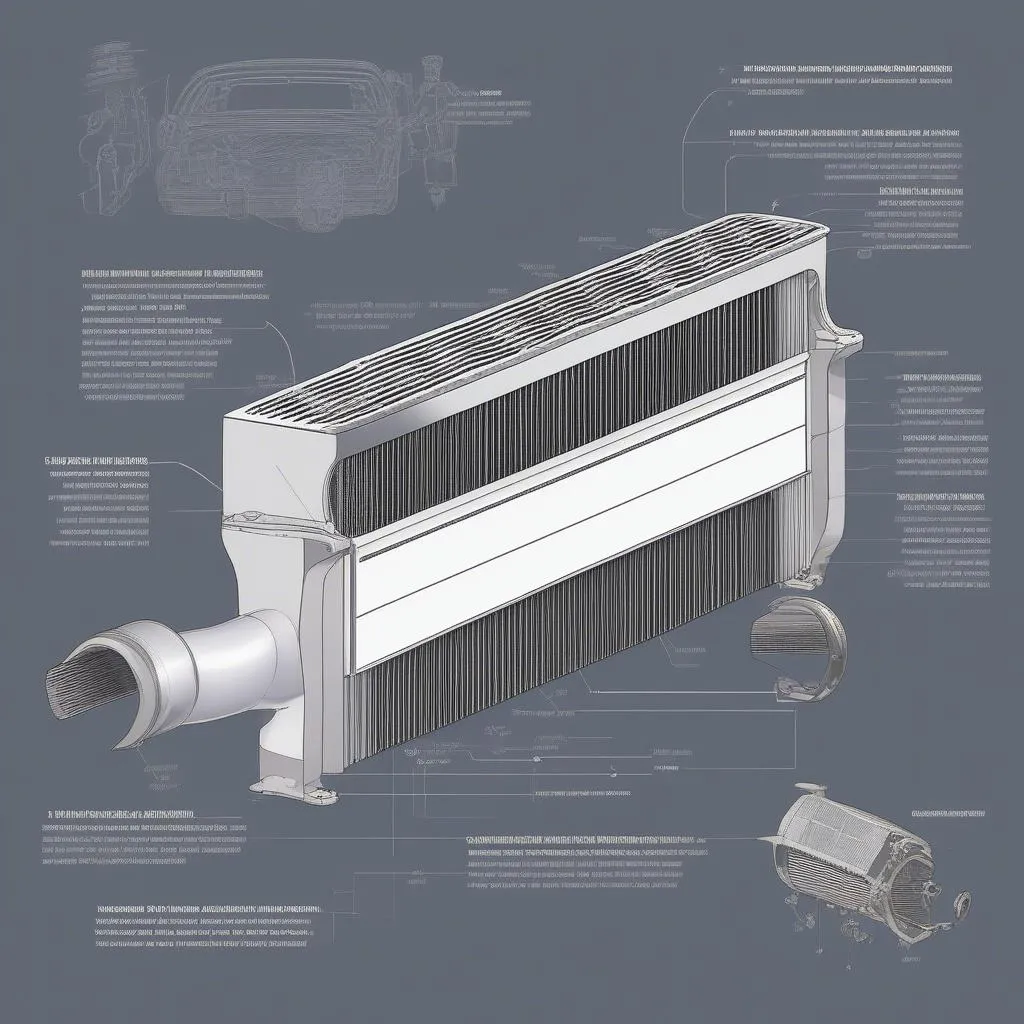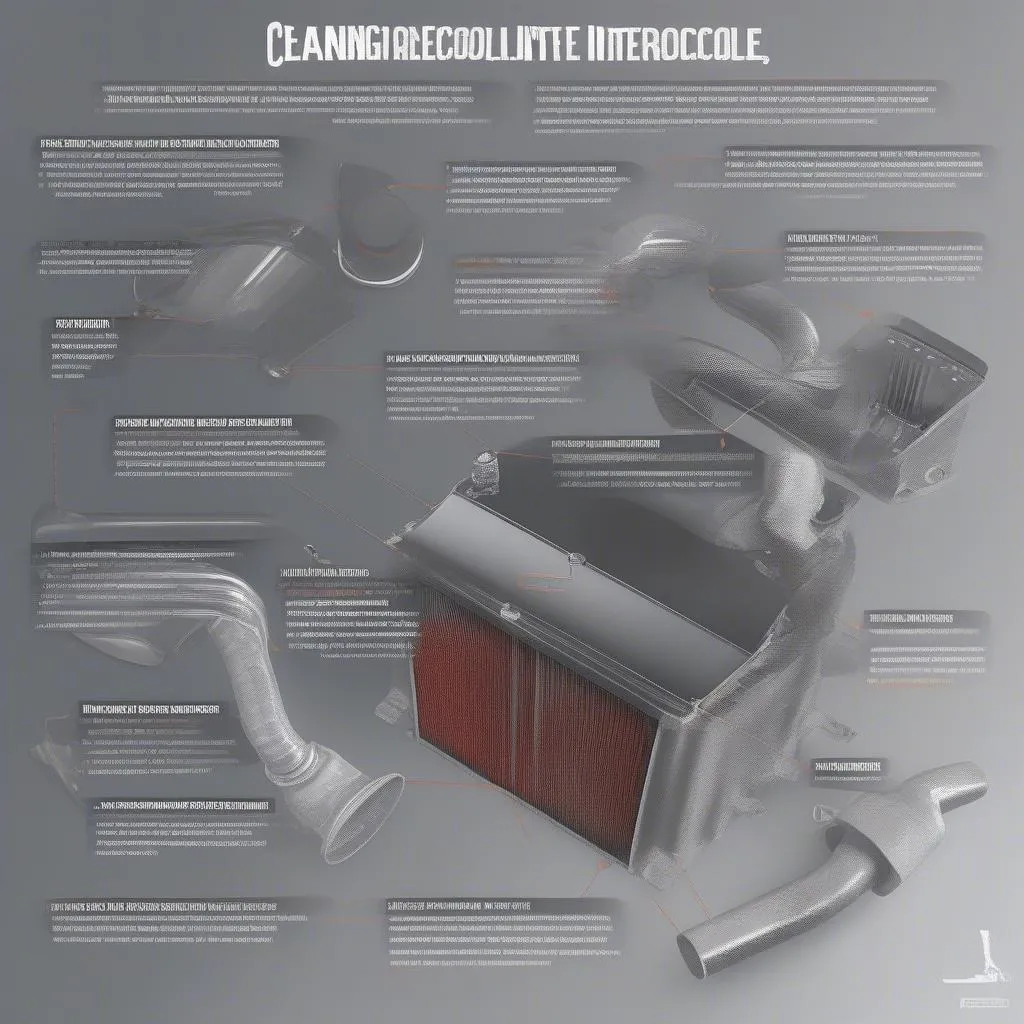Have you ever wondered what that mysterious box tucked away in your car’s engine bay is? You might be looking at the intercooler, a crucial component in many modern vehicles, especially those with turbocharged engines. This guide will delve into the world of intercoolers, exploring their function, benefits, common issues, and everything you need to know about keeping your car running cool and efficient.
Understanding the Intercooler
Imagine you’re pushing your car hard on the open road, the engine roaring with power. As the air rushes through the turbocharger, it gets compressed, raising its temperature. This hot air can actually decrease the engine’s performance, leading to a phenomenon called “knock” or “detonation.” This is where the intercooler steps in as a hero.
Why is an Intercooler Important?
Intercoolers are essentially heat exchangers. They utilize the principles of thermodynamics to cool down the compressed air before it enters the engine. This cooling process achieves a couple of key objectives:
- Enhanced Engine Performance: Cooler air is denser, allowing the engine to ingest more oxygen with each intake stroke. This translates to increased power output and a smoother, more efficient combustion process.
- Reduced Knock Risk: Hot air can trigger premature detonation, putting stress on the engine and potentially causing damage. Intercoolers help prevent this by lowering the temperature, ensuring a safe and stable combustion environment.
Common Intercooler Types
Intercoolers come in various shapes and sizes, and they are usually classified by their location:
- Air-to-Air Intercoolers: These are the most common type, utilizing ambient air to cool the compressed air. They typically feature a series of fins and a core through which air flows.
- Air-to-Water Intercoolers: These utilize a water-based system to transfer heat away from the compressed air. This design allows for greater cooling capacity, particularly useful in high-performance applications.
How Does an Intercooler Work?
Think of an intercooler like a radiator in your car’s cooling system. It takes in the hot air from the turbocharger and directs it through a series of fins. As air flows through the fins, it comes into contact with the ambient air (in air-to-air intercoolers) or a water-cooled system (in air-to-water intercoolers). This heat transfer process cools down the compressed air before it enters the engine.
Intercooler Issues and Troubleshooting
While intercoolers are generally robust components, they can experience issues over time. Here are some common problems and how to troubleshoot them:
- Clogged Intercooler: Over time, dust, dirt, and debris can accumulate within the intercooler, hindering its performance. Regularly cleaning your intercooler is essential for maintaining its efficiency.
- Leaking Intercooler: Cracks or holes in the intercooler can cause air leaks, leading to a loss of boost pressure and a decrease in performance. Inspect the intercooler for any signs of damage.
- Intercooler Core Issues: The intercooler core itself can become damaged, often due to excessive heat or impact. A damaged core will not be able to effectively cool the compressed air.
Signs of a Faulty Intercooler
If you suspect your intercooler might be failing, look out for these common symptoms:
- Loss of Power: A faulty intercooler will struggle to cool the compressed air, resulting in a noticeable drop in engine power.
- Boost Leak: A leak in the intercooler will cause a drop in boost pressure, leading to a less responsive throttle and a decrease in power.
- Engine Knock or Detonation: A malfunctioning intercooler can allow hot air into the engine, increasing the risk of knock. This can result in a knocking or pinging sound coming from the engine.
Intercooler Maintenance Tips
Keeping your intercooler in top shape is crucial for optimal engine performance. Here are some tips:
- Regular Cleaning: Clean your intercooler regularly to remove any accumulated dirt and debris. A simple water and soap solution will do the trick.
- Visual Inspection: Inspect the intercooler for any signs of cracks, holes, or damage.
- Pressure Testing: If you suspect a leak, pressure test the intercooler to confirm the issue.
Intercooler FAQs
Here are some frequently asked questions about intercoolers:
1. Do all cars have intercoolers?
No, not all cars have intercoolers. They are primarily found in vehicles with turbocharged engines.
2. Can I install an intercooler on my naturally aspirated car?
It is possible to install an intercooler on a naturally aspirated car, but it may not be beneficial. Naturally aspirated engines do not have a turbocharger, so the compressed air is not heated as much.
3. What are the benefits of upgrading my intercooler?
Upgrading your intercooler to a larger or more efficient unit can improve engine performance, reduce knock risk, and enhance cooling capacity.
4. How often should I clean my intercooler?
A good rule of thumb is to clean your intercooler every 6 months or whenever it becomes visibly dirty.
Conclusion
The intercooler plays a vital role in enhancing engine performance and ensuring safe and efficient operation, especially in turbocharged vehicles. Understanding its function and common issues can help you keep your car running smoothly and effectively.
If you need assistance with diagnostics or repair of any automotive electrical systems, including intercoolers, feel free to contact us at our Whatsapp number: +84767531508. Our team of experts is available 24/7 to provide assistance and answer your questions.
 Intercooler Diagram
Intercooler Diagram
 Intercooler Cleaning
Intercooler Cleaning
